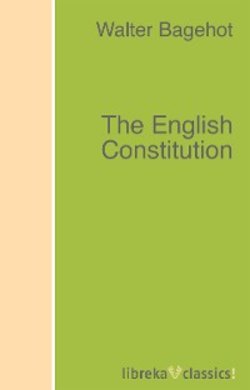The English Constitution

Реклама. ООО «ЛитРес», ИНН: 7719571260.
Отрывок из книги
There is a great difficulty in the way of a writer who attempts to sketch a living Constitution—a Constitution that is in actual work and power. The difficulty is that the object is in constant change. An historical writer does not feel this difficulty: he deals only with the past; he can say definitely, the Constitution worked in such and such a manner in the year at which he begins, and in a manner in such and such respects different in the year at which he ends; he begins with a definite point of time and ends with one also. But a contemporary writer who tries to paint what is before him is puzzled and a perplexed: what he sees is changing daily. He must paint it as it stood at some one time, or else he will be putting side by side in his representations things which never were contemporaneous in reality. The difficulty is the greater because a writer who deals with a living Government naturally compares it with the most important other living Governments, and these are changing too; what he illustrates are altered in one way, and his sources of illustration are altered probably in a different way. This difficulty has been constantly in my way in preparing a second edition of this book. It describes the English Constitution as it stood in the years 1865 and 1866. Roughly speaking, it describes its working as it was in the time of Lord Palmerston; and since that time there have been many changes, some of spirit and some of detail. In so short a period there have rarely been more changes. If I had given a sketch of the Palmerston time as a sketch of the present time, it would have been in many points untrue; and if I had tried to change the sketch of seven years since into a sketch of the present time, I should probably have blurred the picture and have given something equally unlike both.
.....
In one minor respect, indeed, I think we may see with distinctness the effect of the Reform Bill of 1867. I think it has completed one change which the Act of 1832 began; it has completed the change which that Act made in the relation of the House of Lords to the House of Commons. As I have endeavoured in this book to explain, the literary theory of the English Constitution is on this point quite wrong as usual. According to that theory, the two Houses are two branches of the legislature, perfectly equal and perfectly distinct. But before the Act of 1832 they were not so distinct; there was a very large and a very strong common element. By their commanding influence in many boroughs and counties the Lords nominated a considerable part of the Commons; the majority of the other part were the richer gentry—men in most respects like the Lords, and sympathising with the Lords. Under the Constitution as it then was the two Houses were not in their essence distinct; they were in their essence similar; they were, in the main, not Houses of contrasted origin, but Houses of like origin. The predominant part of both was taken from the same class—from the English gentry, titled and untitled. By the Act of 1832 this was much altered. The aristocracy and the gentry lost their predominance in the House of Commons; that predominance passed to the middle class. The two Houses then became distinct, but then they ceased to be co-equal. The Duke of Wellington, in a most remarkable paper, has explained what pains he took to induce the Lords to submit to their new position, and to submit, time after time, their will to the will of the Commons.
The Reform Act of 1867 has, I think, unmistakably completed the effect which the Act of 1832 began, but left unfinished. The middle class element has gained greatly by the second change, and the aristocratic element has lost greatly. If you examine carefully the lists of members, especially of the most prominent members, of either side of the House, you will not find that they are in general aristocratic names. Considering the power and position of the titled aristocracy, you will perhaps be astonished at the small degree in which it contributes to the active part of our governing assembly. The spirit of our present House of Commons is plutocratic, not aristocratic; its most prominent statesmen are not men of ancient descent or of great hereditary estate; they are men mostly of substantial means, but they are mostly, too, connected more or less closely with the new trading wealth. The spirit of the two Assemblies has become far more contrasted than it ever was.
.....